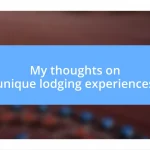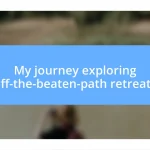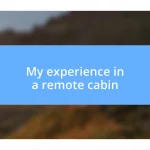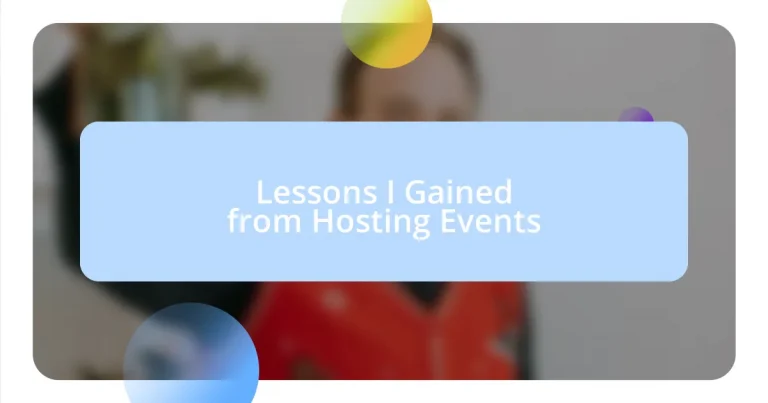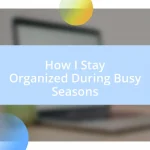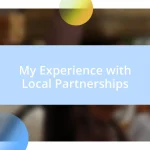Key takeaways:
- Hosting events fosters connections and showcases leadership skills, creating a sense of community and shared experiences.
- Effective preparation involves defining goals, creating timelines, budgeting wisely, and engaging the right team.
- Key skills for event hosts include communication, adaptability, and time management to handle unforeseen challenges successfully.
- Evaluating success goes beyond attendance numbers to include audience engagement and meaningful follow-up feedback.
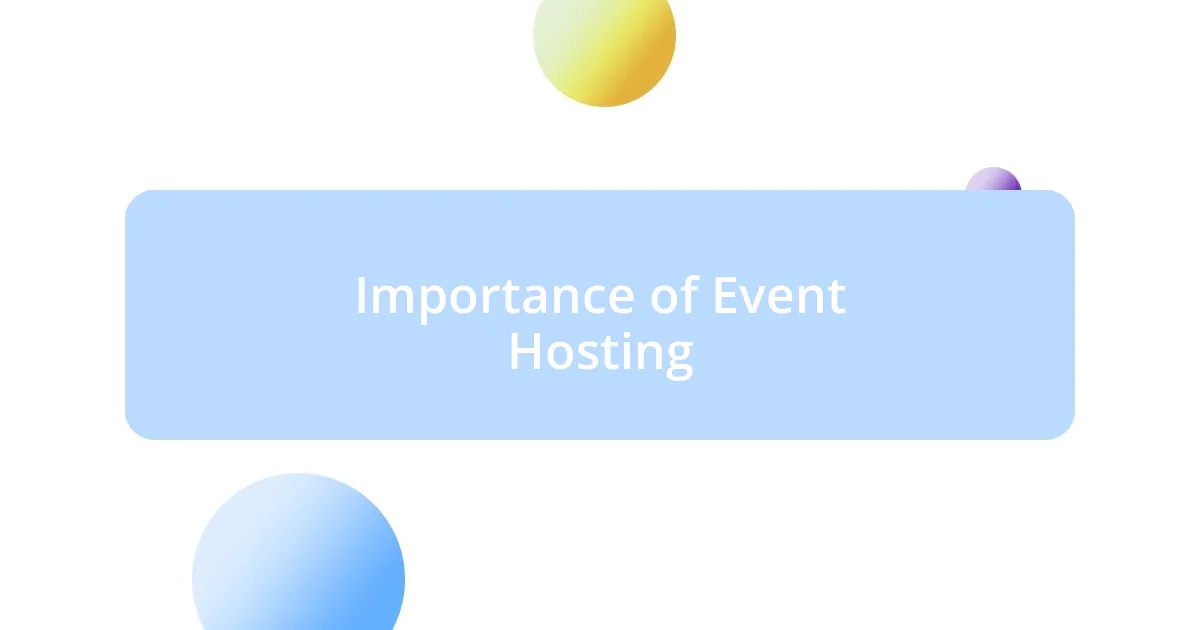
Importance of Event Hosting
Hosting events is a significant opportunity for building connections and fostering relationships. I remember attending a community event where I was struck by how diverse the attendees were. It made me realize that when we come together in a shared space, we create a tapestry of experiences and backgrounds that enrich our understanding of one another. Have you ever felt that electric buzz in the air when strangers become friends through shared interests?
Moreover, organizing an event enables you to showcase your leadership skills. I once coordinated a charity fundraiser that required not just planning but motivating a team of volunteers. The sense of accomplishment I felt when we succeeded was unparalleled. It taught me that event hosting isn’t just about the event itself; it’s about inspiring others and making a positive impact in the community.
Events also serve as a powerful platform for learning. After hosting a workshop, I was astounded by the wealth of knowledge shared among participants. Each interaction turned into an informal lesson, proving that hosting an event can spark a dialogue that deepens understanding and challenges our perceptions. Isn’t it amazing how one gathering can lead to insights you never anticipated?
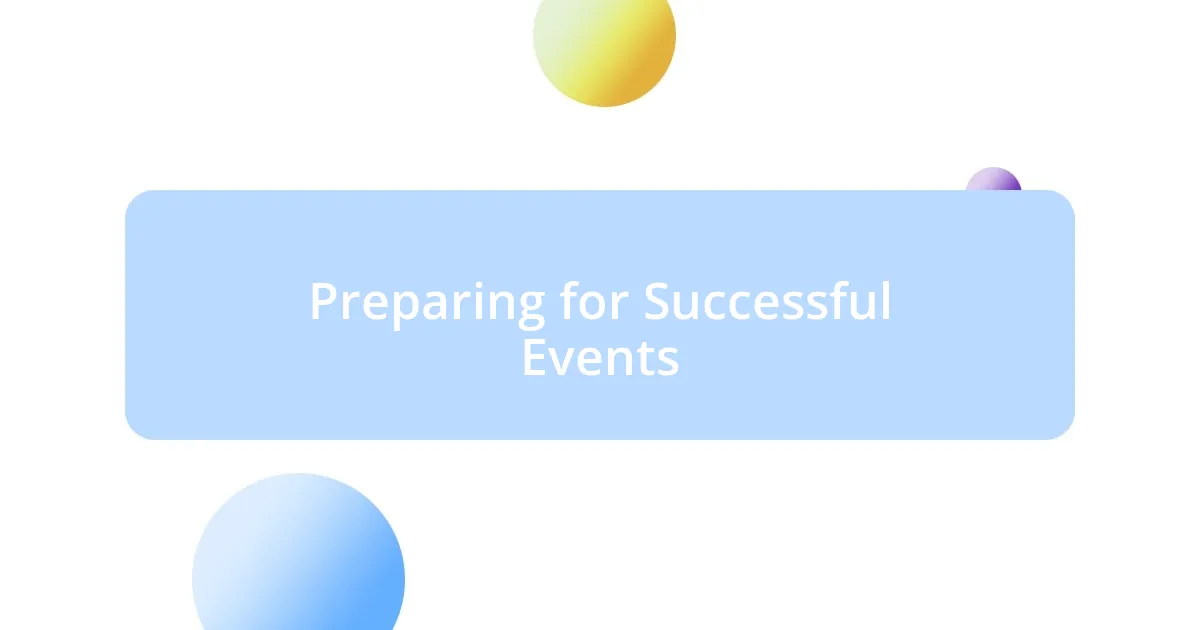
Preparing for Successful Events
Preparing for a successful event is like painting a masterpiece. Each stroke of preparation adds depth and clarity to the final picture. I remember the anxiety I felt while planning my first corporate networking event. The pressure of ensuring everything went smoothly was palpable. However, I quickly realized that a well-structured plan was my best ally.
Here are some essential elements to consider:
- Define Your Goals: What do you want to achieve with this event? Setting clear objectives guides your decisions.
- Create a Timeline: Map out a schedule detailing milestones, from booking the venue to following up post-event.
- Budget Wisely: Allocate funds for every aspect, from catering to entertainment, to avoid last-minute surprises.
- Engage the Right Team: Surround yourself with a reliable team, each member dedicated to their specific tasks.
- Promote Effectively: Use various channels to advertise your event—social media, newsletters, and word of mouth.
- Prepare for Contingencies: Have backup plans in place for unforeseen circumstances, like bad weather or technical issues.
With these steps in mind, taking the plunge into event hosting becomes a lot less daunting. I can’t help but feel a thrill at the thought of bringing people together, knowing that, despite the challenges, every event has the potential to create impactful memories.
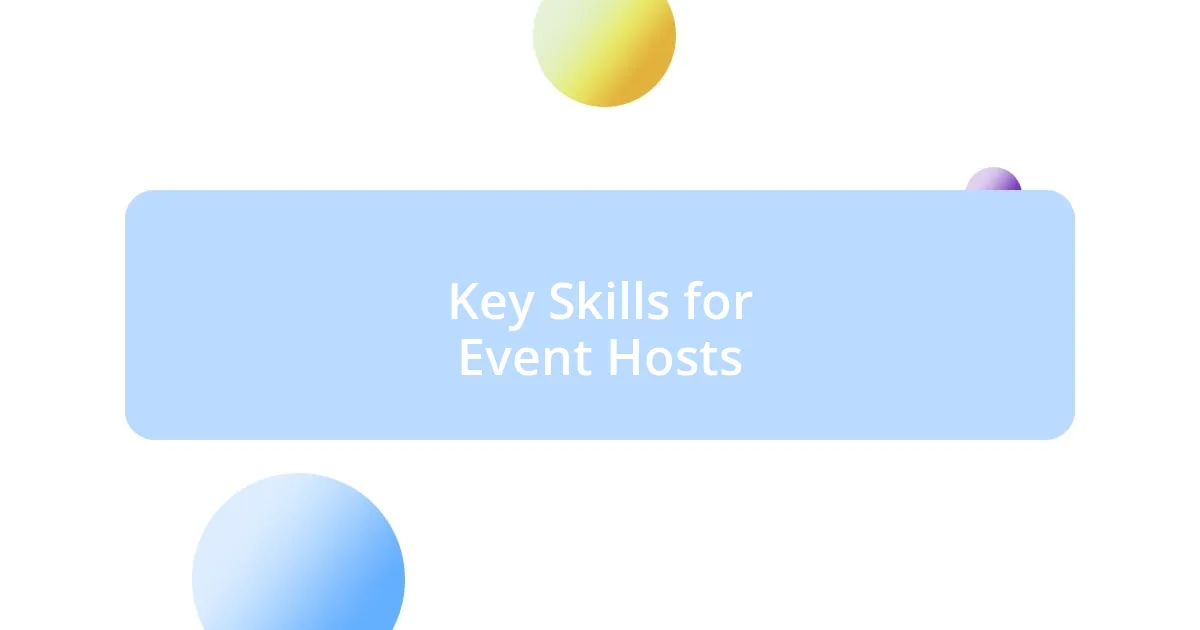
Key Skills for Event Hosts
When I think about the key skills essential for event hosts, communication immediately comes to mind. This isn’t just about speaking clearly, but also about listening attentively. I recall a time when I was facilitating a panel discussion; during the Q&A session, some audience members had pressing questions. By actively listening and responding thoughtfully, I was able to foster a warm atmosphere where everyone felt valued. It was rewarding to see how this open dialogue sparked deeper engagement among participants.
Another crucial skill is adaptability. In my experience, events rarely go exactly as planned, and I’ve learned to embrace the unexpected. At one outdoor festival, we faced an unexpected rainstorm. Instead of panicking, I quickly called an audible, shifting part of the event indoors while ensuring that attendees remained entertained. That experience taught me that flexibility can turn potential disasters into opportunities for creativity and connection.
Time management has proven to be a game-changer for me as well. I remember my first large-scale event where I underestimated how long certain tasks would take. The lesson was hard-earned; I found myself racing against the clock as the event started. Now, I always leave extra time for setup and unforeseen delays, recognizing that a well-timed event flows better and leaves a lasting impression on attendees.
| Key Skill | Description |
|---|---|
| Communication | Engaging in clear dialogue while actively listening to attendees fosters connection. |
| Adaptability | Embracing the unexpected allows for creative problem-solving during events. |
| Time Management | Properly allocating time to tasks ensures a smoother event execution. |
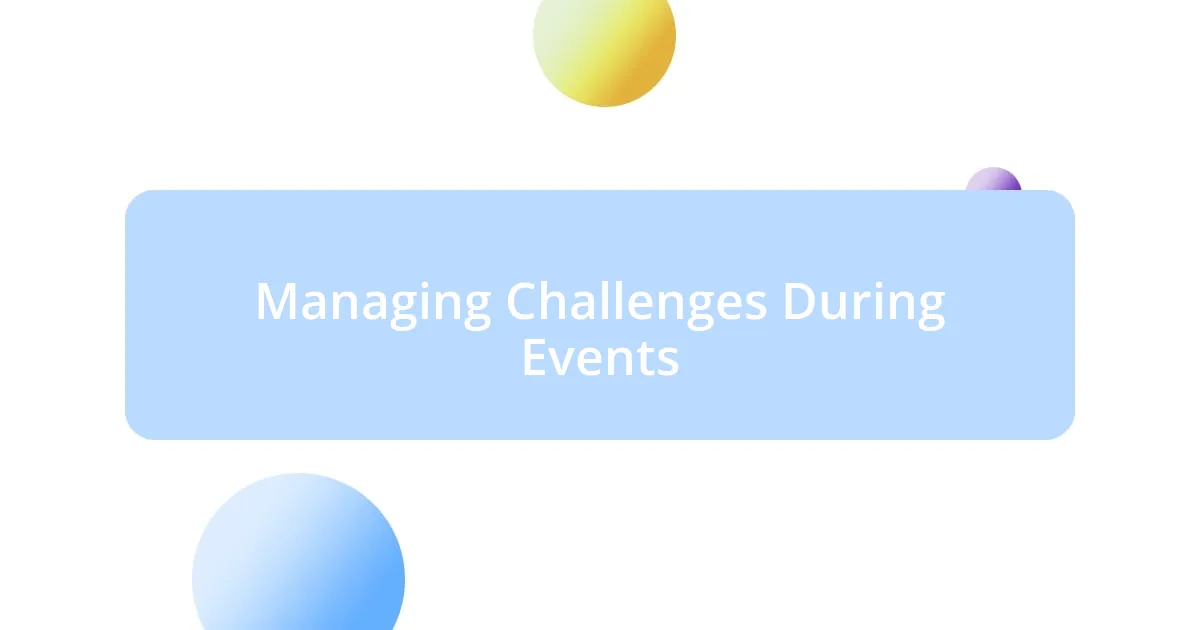
Managing Challenges During Events
When managing challenges during events, I often find that experiencing setbacks firsthand can lead to the most significant growth. I recall a time when our keynote speaker canceled just hours before the event. Instead of panicking, I reached out to a nearby industry expert who was willing to step in. It felt like a leap of faith, but the enthusiasm that expert brought to the table turned a potentially awkward moment into a memorable highlight. Have you ever had to improvise on the spot? Those quick recoveries can lead to unexpected brilliance.
Communication, in moments of crisis, is absolutely vital. During a gala I hosted, a technical glitch caused the audio to cut out right as the band began their set. In that instant, I had to stay calm and reassure the audience while the team worked to fix it. I grabbed the microphone and started chatting with the guests about the evening’s theme, turning an uncomfortable silence into an engaging interlude. By the time the music resumed, everyone was more connected, laughing and chatting. Isn’t it interesting how a little transparency can foster a sense of camaraderie during a hiccup?
Lastly, I’ve learned the importance of staying one step ahead. For instance, at a recent event, I noticed a small crowd forming around the refreshment table. Anticipating a shortage, I quickly arranged for extra supplies to be brought in. It’s that little foresight that can make a world of difference. I often ask myself, how prepared do I want to be for the unexpected? I’ve realized that being proactive allows me to enjoy the moment, rather than worry about what might go wrong.
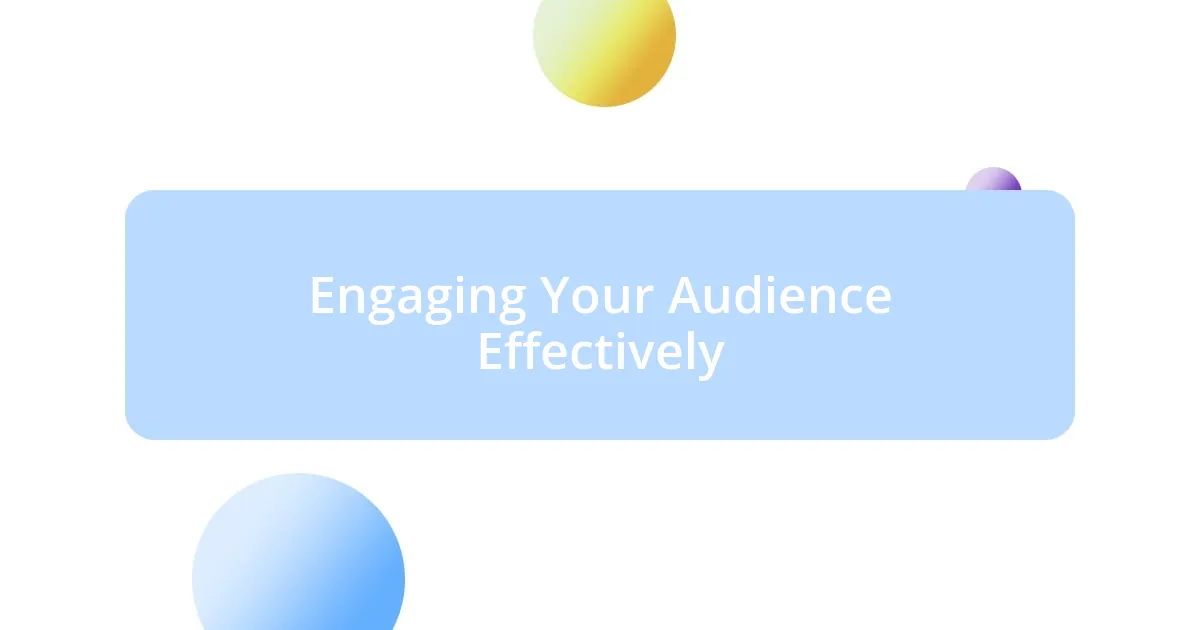
Engaging Your Audience Effectively
Engaging your audience is an art, and I believe that the key to mastering it lies in making personal connections. I’ll never forget a small networking event I hosted where, instead of diving into the agenda, I kicked things off with a light-hearted story about my own experiences in the industry. This simple act transformed the atmosphere. People instantly warmed up, opening up and sharing their own journeys. Isn’t it incredible how vulnerability can create a sense of belonging?
Another strategy that has worked wonders for me is incorporating interactive elements. During one of my workshops, I decided to break the traditional format by introducing small group discussions. It was thrilling to watch participants engage passionately amongst themselves, generating their own ideas and insights. It made me realize how much more valuable shared experiences are compared to a one-sided presentation. Have you ever participated in something where you felt your voice truly mattered? That connection is what I strive to create.
Moreover, I’ve found that visual storytelling can be a powerful tool for keeping the audience engaged. I once included a series of personal photos in my presentation, highlighting the behind-the-scenes moments of event planning. The reaction was overwhelmingly positive; people not only loved the visuals but also felt a greater connection to the content. I’ve learned that sharing genuine moments can transform a standard talk into a shared experience. Can you recall a time when a story or image truly resonated with you?
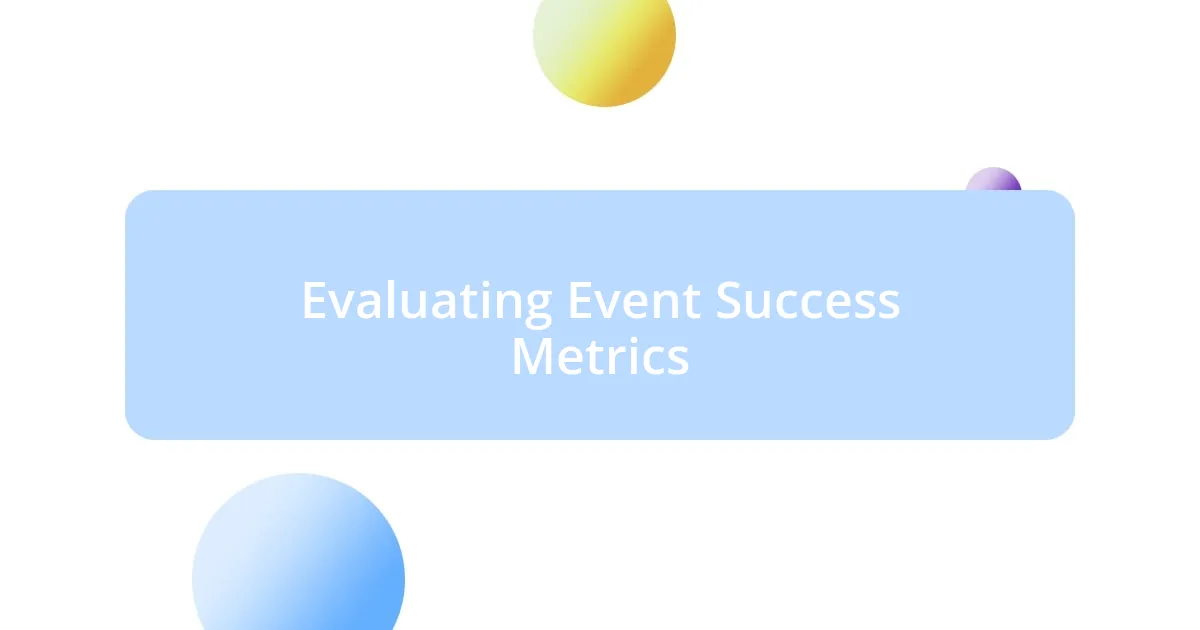
Evaluating Event Success Metrics
When it comes to evaluating event success metrics, I’ve found that numbers alone don’t tell the whole story. After hosting a community festival, I meticulously reviewed attendance figures, but I couldn’t shake the feeling that success lay in something deeper. I decided to survey attendees afterward, and the heartfelt feedback I received about how the event fostered connections was profoundly enlightening. Has anyone else noticed how sentiments often reveal what numbers can’t?
One key metric I focus on is audience engagement. I’ll never forget a workshop where I monitored the interaction levels throughout the sessions. By organizing real-time polls and discussions, I was able to gauge not only participation but also the energy in the room. The excitement in their voices during a spontaneous brainstorming session proved to me that engagement metrics could truly reflect the event’s impact. Have you considered how audience energy can redefine success?
Ultimately, post-event follow-ups are invaluable in assessing success. After my last event, I took the time to reach out to attendees and speakers for their thoughts. The insights I gained were immensely helpful, revealing what resonated and what didn’t. This reflective practice not only helps improve future events but also builds a sense of community. Have you experienced the power of thoughtful follow-ups in your events? Those conversations can turn a one-off event into the beginning of lasting relationships.
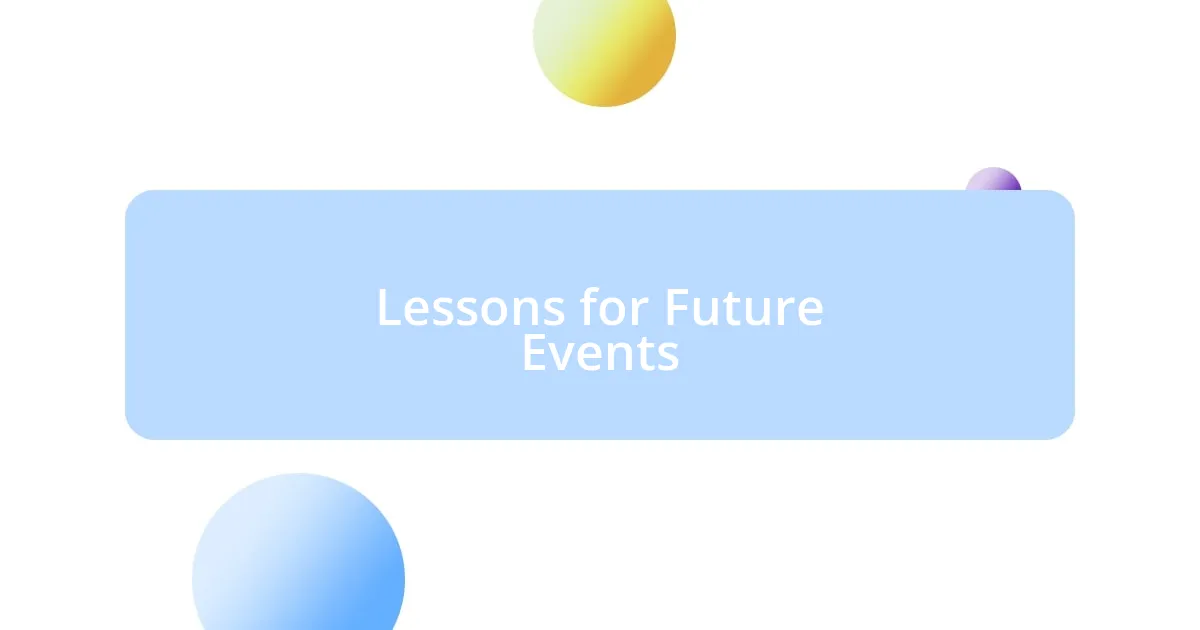
Lessons for Future Events
In planning future events, I’ve learned that flexibility is crucial. Once, I hosted a seminar where one of the main speakers fell ill at the last minute. Instead of panicking, I opted for a panel discussion with other experts present. The spontaneous change not only salvaged the event but also created a dynamic conversation that engaged the audience in ways I never anticipated. Have you ever found that a change in plans led to a better outcome?
Another lesson revolves around the importance of detailed planning, especially regarding logistics. At one community gathering, we underestimated the need for sufficient seating and materials. It was disheartening to see attendees feeling crowded and unprepared. Since then, I’ve made it a point to always overestimate my requirements. Have you ever found yourself in a situation where a simple oversight turned into a major hiccup?
Lastly, I cannot stress enough the value of building a strong team. I recall an annual fundraiser where I leaned too heavily on my own efforts. Burnt out and overwhelmed, I realized that collaboration multiplies creativity and reduces stress. By empowering others and distributing tasks, I felt not only supported but also enriched by diverse ideas. Have you experienced the magic that happens when you let others step up and contribute?




